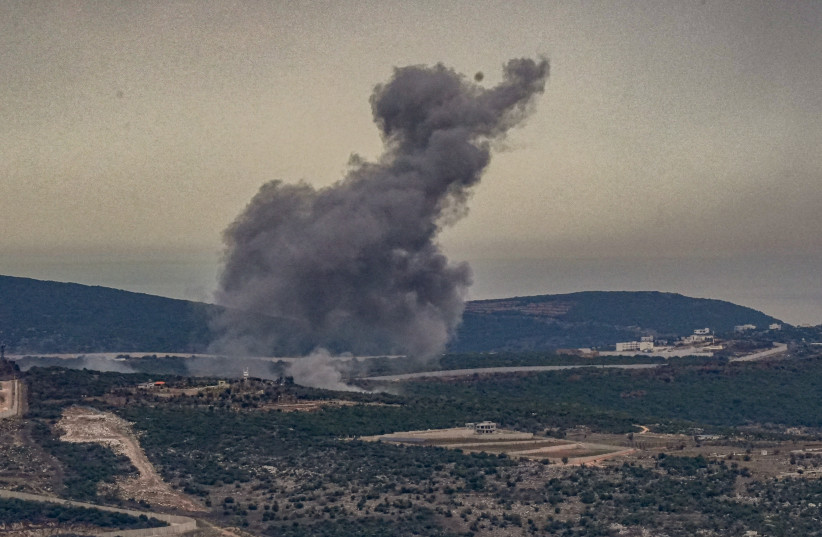Iranian pro-regime media is full of stories about everyday issues in Iran, such as tackling corruption. While Iran may prefer domestic bliss at home and doesn’t want the war to rock the boat in Tehran, it wants its proxies to carry out attacks on the US and Israel. Iran has used messaging since early October that this is a regional conflict. While Hamas, Hezbollah, and the Houthis in Yemen target Israel, Iran prefers that Iraqi and Syrian groups target the US. This is a clear strategy since early October. Iranian proxies have targeted US forces more than 50 times in Iraq and Syria.
Towards this end, the pro-Iran Al-Mayadeen media said on Thursday that the “Islamic Resistance in Iraq - Kataib Hezbollah, affirmed its solidarity with the Gaza Strip and the Palestinian resistance in the battle of the ‘Al-Aqsa Flood,’ stressing its commitment to direct strikes in response to the crimes of the Zionist-American aggression.” This statement reads more like a forced statement since it was never in question if Kataib Hezbollah has solidarity with all these groups. Kataib Hezbollah has been behind attacks on the US for years. It also is behind the kidnapping of Elizabeth Tsurkov, the Israeli researcher who also holds Russian citizenship and is being held in Iraq. A recent video of her was released by terrorists in Iraq.
The US killed Abu Mahdi al-Muhandis, the leader of Kataib Hezbollah in January 2020. He was struck by a missile fired from a US drone as he sat next to Qasem Soleimani, the IRGC Quds Force leader. Taking out both of them weakened the Iranian “axis” in the region, which Iran refers to as the “resistance.”
Now Kataib Hezbollah is speaking about the “Steadfastness” of Hamas in the face of the “brutality” of Israel. More important, the group says that Israel is “supported by the latest American military and intelligence machines, in addition to the support of England, France, and other Western countries.” The message is clear. While Gaza suffers under Hamas rule, Iran’s proxies in Iraq will continue to attack Western targets. The article at Al-Mayadeen refers to the “crimes of the Zionist-American enemy.” Kataib Hezbollah says that there will be “punishment” and “deterrence” directed at the “enemy.” The enemy will receive the “harshest blows and harshest slaps…until the liberation of the land of Palestine from the river to the sea.”

Growing conflicts between proxies and the US
Iranian-backed groups in Iraq targeted Asad base on Wednesday, the report said. This large base has some US forces present. They are there at the invitation of Iraq. The US has operated in Iraq since 2014 to help defeat ISIS. Iranian-backed groups targeted US forces many times after the US invasion of Iraq in 2003. Iran was a major beneficiary of that invasion and it wanted the US to rid Iraq of Saddam, but then Iran exploited the power vacuum to fill it with militias. After ISIS was defeated in Iraq in 2017, the militias began to target the US. This increased in 2019. The militias in Iraq include Kataib Hezbollah, Asaib Ahl al-Haql, Al-Nujaba and a plethora of other groups. Many of them play a role in politics, money laundering, holding checkpoints, government affairs, extrajudicial executions and corruption.
Iran doesn’t hide what its doing in Iraq. The recent article on Kataib Hezbollah’s actions said that the attack on US forces “comes within the framework of its operations in support of Gaza.” The report comes at the same time as Reuters reported this week that Iran would not enter a larger conflict against Israel. That report also claimed Iran was not aware of the attack on Israel on October 7. This is one of these “unknown knowns” stories. Iran may have known but may not want the West to know that it did. Iran may also be planning to enter the wider regional war, but wants to pretend it isn’t.
The Mayadeen report about Iraq also discussed the role of the Kata'ib Sayyid Al-Shuhada militia. Abu Alaa Al-Walai, is the Secretary-General of the Iraqi Shia militia Kata'ib Sayyid Al-Shuhada. In September 10, 2019, he gave an interview on Al-Sharqiya News TV in Iraq where he claimed that “American forces in Iraq will be taken hostage by Islamic resistance forces if a US-Iran war breaks out,” according to an article at MEMRI. He also told Al-Alam TV in Iran, that his group could attack Israel from Lebanon or Syria. Now Walai said that attacks on the US won’t cease in Iraq until the war in Gaza stops. Another Iranian-backed militia leader, Akram Abbas al-Ka'abi, the founder and Secretary-General of Harakat Hezbollah al-Nujaba in Iraq said that his group won’t stop attacks on the US. He is a US-designated terrorist and is closely linked with the IRGC in Iraq.
The overall context of these statements is that these groups want to show they are supporting Hamas. However, it is Iran that is pushing them toward more action. They appear to prefer more statements and to carry out attacks that are relatively small. This shows the challenge Iran has in mobilizing its “axis” of resistance. In reality, many of these groups are weak links in the chain of Iranian influence that stretches from Beirut to Syria and Iraq and then stretches to Yemen and the Bab al-Mandab straits. These groups have not shown their willingness to go “all in” yet.
